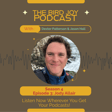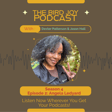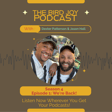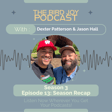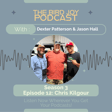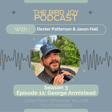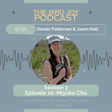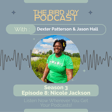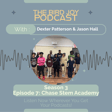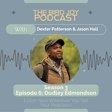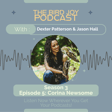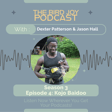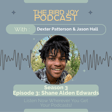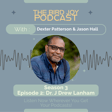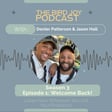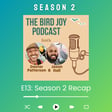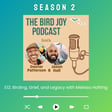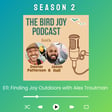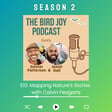Introduction to Bird Joy and Diversity
00:00:00
Speaker
We are back. We are back. What episode is this? Episode four.
00:00:09
Speaker
fire. This is so crazy. I was like, wait a minute. We are four episodes into this thing. Welcome back again to the podcast. I'm Dexter Patterson. And I am Jason Hall. This podcast is for all the homies across the globe. Just a beautiful, beautiful space where we can celebrate some bird joy together. Yes. Yes. Yes. If you're here, you're here for some bird joy. I hope so.
00:00:38
Speaker
I really hope so. Because that's what we're going to give.
Why Does Diversity Matter in Birding?
00:00:40
Speaker
We're going to give you a little bit of virtue.
00:00:42
Speaker
Let's go. Well, let's go. You know, you just mentioned we're four episodes into this thing, man. This is wild, dude. Two brothers talking about birds. Who would have thought? This is so cool. Two brothers on the air right now talking about birds all over the world. People are listening to us talk about birds. Talk about diversity and burden. You and I on a podcast just nerding out about birds every week.
00:01:11
Speaker
Yeah, I can't imagine anything better. And I think it's going to be so beautiful today to explore you and I as a symptom and outcome of the actions of many others to get us out there into birding. And you and I as an example of why diversity and birding is so important. Right. Yeah. So many other things.
00:01:34
Speaker
It will kind of give a nice little introduction to this idea of diversity and burden because there's so much to the story. I do want to start off by us just kind of just discussing why, right? Back to that word why again.
00:01:51
Speaker
Like it means something. It's like the why it means something. Why diversity and representation are so crucial in the burden community as a whole. Why is it important, Jason? So, man, we could talk about this for eight
Benefits of Diversity in Birding
00:02:06
Speaker
hours. We could have a conference about this.
00:02:09
Speaker
Maybe one day we will, but today I would start with the same wise that we use for a lot of other things. And it's really, we experienced so many things as humans out there. They're not all coming from the same place. And we've had these conversations around the United States, at least around.
00:02:25
Speaker
you know why is it important to have women in science why is it important to have black and brown folks in science why is it important to have diverse schools diverse teachers diverse workforce diverse small business owners it's very simple it's because it benefits everyone creates a better community it creates more opportunity it creates more learning it creates more knowledge
00:02:48
Speaker
And if you pare all that down to just the activity of birding, there is no way you can escape the fact that if you get more black and brown folks involved in birding, if you get more differently abled folks involved in birding, birds will benefit. People will benefit. The activity of birding, the community will benefit. And all that will do is compound on itself. It will grow exponentially.
00:03:10
Speaker
All right. And so it's not a very simple answer, but it's a very big answer. It's a very impactful answer because you can imagine what this world would be like if let's say the 96 million birders across the country used in a broad term was majority BIPOC birders. Can you imagine what that would be like? Right. Feeding into research, learning, community, mental health. It would just be insane. That is, that is a big why for me.
00:03:38
Speaker
is I want to make sure birding catches all of the resources it possibly can to bring communities of color, different able communities, different religious communities into this activity because it's only going to make us all better. It's literally when they talk about representation matters.
00:03:55
Speaker
That's the argument that you give right there of why. Because it makes you a better human being. I think it gives us a perspective on the world that's more holistic. It gives us more meaning to life as a whole when we're not trapped in our own echo chambers and our own little boxes of information.
Changing Perceptions and Representation
00:04:16
Speaker
Being around a lot of people
00:04:18
Speaker
And that common thread being this love for our feathered friends of birds, man, I think that's why it's important. I think there's so much hate. There's so much division. There's all this stuff happening in people's lives all the time. And I feel like burning can be that one thing that kind of brings people together.
00:04:37
Speaker
And i think if we're able to create those conversations by creating spaces that allows us to make those places as welcoming to everybody as possible and especially our by communities the differently able birders all over the world.
00:04:55
Speaker
Underrepresented groups as a whole and allies that share this mission that burning is for everyone, that's why it's important. I think it starts with that idea of representation, seeing people that look like you at the burning event, seeing people that look like you or your friends or your relatives leading these burning events. It's just this conversation, we can change it
00:05:18
Speaker
what people think a birder look like, what people think a birder sounds like, what they think a birder is, how you bird, we can change it all. And we start thinking about why diversity, why representation are critical and crucial to the birder community as a whole all
Cultural Influences and Historical Figures
00:05:35
Speaker
over the country.
00:05:35
Speaker
I think one of the things that excites me the most is if you look at a lot of the things, let's take music for example, and the influence of black and brown folks on music globally, and everything you thought was from one place to the other, especially in the United States, and most times comes down to an African-American person brought that heat that got that whole thing started. Culture, food, music.
00:05:57
Speaker
dance, everything. Then you look at birding and you say, man, where is our, where is our history there with the natural world? And it's there. Birding is a great place to get people connected with that, to learn about different figures in history and how they use birds, right? Everyone tells a story about Harriet Tubman using the call of the bard owl. She learned when she was working, I think it was, I think she was working on a, like a timber farm or something with her dad. And she learned some of those calls cause she would be out
00:06:25
Speaker
on these work trips, right, and they would camp. And she used that, because it was part of the environment, right? She knew that. Young Moses, who was the slave of Charles Peel here in Philadelphia, and his parents were enslaved, and the laws at the time, they weren't allowed to take their children with them once they were emancipated. Young Moses had to stay with Mr. Peel, and ended up learning birds. He is arguably one of the first, or if not the only, or the first,
00:06:53
Speaker
black ornithologist in the history of the United States. And not a lot of people know about it. There's a great gentleman here in Philadelphia, Matt Healy, I think his name is has done some research on it. And it's been really great to learn about that kind of stuff. And so you say to yourself, well, what is happening now?
00:07:13
Speaker
What is happening now with the birds? How can these communities connect? And you think of one of my favorites, Dr. J. Drew Lanham and the works he's come out with, A Home Place, A Colored Man's Love Affair with Nature, write his book, Sparrow Envy, poetry book. You're reading this and you're just realizing this very unique and deep connection.
00:07:36
Speaker
with the world and an environment from a black man growing up in the South. And you wonder how many of these stories are across the United States that we've never heard, because like many things here, they get whitewashed out
Youth Engagement and Community Growth
00:07:50
Speaker
of history. And so for me, part of the excitement around bringing more diversity to birding is being able to uncover those, being able to create a connection, and essentially making new ones. Because the more people we get into it 100 years from now,
00:08:05
Speaker
Some of those folks might be people that our descendants talk about in terms of why they're so into nature at that point. Right. So it's really exciting to think about trying to create those personal experiences early in life. And I start thinking about some of my personal experiences and trying to shape some of those experiences for other people earlier in life. Like I always be like, I always like birds, but I never gave them the attention they deserve.
00:08:33
Speaker
And I waited way too long. So I'm hoping that whether they're showing up at our club events or they're listening to this podcast, that hopefully we're getting some people to pay attention to the birds earlier in life. Pay attention a little bit earlier.
00:08:50
Speaker
and really it kind of go get your own stories. When I think about the stories and I think about going early on in my birding career and going to some of these more traditional birding spaces and looking around and I'm like, I'm the only black dude here. Same.
00:09:05
Speaker
You know? Wait a minute. I don't see nobody that looks like me leading this walk either. Okay. Should I be here? I want people to think about that. We've talked about representation, showing up into these spaces and seeing people that look like you, seeing people that look like your loved ones leading and teaching.
00:09:23
Speaker
That's important. I think that's really important. And I think wanting to be a part of that solution in my community. And that was sparked when I think back of what happened to Christian back in 2020 and the whole uprise of Get Outside and Black AF and STEM and Black Murders Week back then and thinking about that movement as a whole and how it really inspired
00:09:47
Speaker
I know it inspired you.
Building Inclusive Birding Spaces
00:09:49
Speaker
We talked about this. Realizing, wait a minute, there's a lot of the homies out here. We're like all over the place. It's crazy. Like I remember being on what was in on his Twitter, right? And at first Blackbirders week, one of the first events was like, I was like, hashtag introduce yourself or something like that.
00:10:05
Speaker
And I just took a stupid little selfie of me standing by one of my favorite burden spots. And I was like, Hey, I'm Jason, the burden for this long dot, dot, dot, dot, man. I logged on that John later on. And it was just like thousands of likes, tons of comments. Other people being like, yo, homie, I'm like down in Philly, like, you know, it's people in New York. And you're just like.
00:10:25
Speaker
Yo, we are out here and we didn't even know it until these beautiful souls at Black AF and STEM started Black Birders Week. It just, it just like, that's part of the reason why you and I are here, right? Like it's just, that's the way it happened, right? It's only gotten bigger and better from there.
00:10:41
Speaker
And the amount of joy that we felt in the five years since then with our communities that we've helped to build and new people that we've met is immeasurable. I wish I could quantify it in a way that explains to people why that's important to birding. But simply put, you now have a new community of people that are being connected and finding resources and contributing to bird conservation, contributing to
00:11:06
Speaker
communities getting access to the mental health benefits of birding communities getting access to the data around birding so they can help advocate for green spaces right like this is all really important and it's just the tip of the iceberg truly the tip of the iceberg for black and brown communities
00:11:21
Speaker
community is getting involved in this. So it is one of my favorite things to think about. I sometimes daydream, like the only reason I would want to live forever is just to, if I had like a recliner that I could just sit in the sky and just watch what's happening on earth. Right. And just, what do we do? Where do we go with some of this stuff? What does the black and brown bird and community look like in a hundred years? That's very exciting to me. I see it being just like, I, you know, I say this to people all the time and it probably sounds trite to them, but like in the communities that we grow up with,
00:11:48
Speaker
at least in mine for black and brown community sports was a big thing and it could it could have been any sport depending on which community you were in you know basketball everyone knows that's a heavily cultural point of black communities and it's important and it's an incredible gateway to learning about teamwork and community and so on and it's great and no one dodges that we love that i especially living in philly because you always got these clowns from new york talking about the home of basketball and da da da da whatever imagine a bird
00:12:16
Speaker
was like that. Imagine if birding was like that for our community. Imagine if birding was something that you went out and did with your friends. Now granted, it's got a little bird nerd tinge to it, so it maybe won't become ever as popular as basketball, and that's fine. But in my future, every black and brown child, at least in and around Philly,
00:12:35
Speaker
needs to know that birding is an activity they can go do, right? If they choose to. So there's, there's a lot to talk about there with diversity and birding. And I think making sure on this podcast episode that we find some joy around it is really key because like you said, the world is crazy out there and there's a lot of hate and it's very easy to get stuck into the trauma of these situations. And I want people to do their best to try and flip that into, well, where are we going to go now to combat that trauma with joy, with healing, with community?
00:13:04
Speaker
Yeah, and I would really encourage people to find places like In Color Birding, and the BIPOC Birding Club of Wisconsin, and all these amazing groups that we've talked about on this podcast all over the country. They're around. If they're not in your community, think about being part of that solution. Think about creating those spaces, because I think once we create those spaces, people can call it cliche, and they may hate hearing it all the time, but those safe spaces matter.
00:13:33
Speaker
Create them. If they're not there, create them and build that community because it was quick for us. And I'd love to hear your thoughts on this. We created our first event, didn't really know. I kind of had a feeling because I was like, if I needed this, other people probably needed this too. So I had this feeling and I'm like, we created, they shall come. Honestly, that's kind of how I felt. And Jeff was like, I don't know. I said, I kind of have a good feeling about this.
00:14:02
Speaker
You know, I think there are more people that are curious and kind of want to go out here and have a community. We call it our little flock. Just have a group of burdeners that they can be around and it's always changing. One thing that never changes is like this welcoming feeling of like, yep, this is my spot. I belong here. That never changes. And I think that's what I'm most proud about is just being a part of that solution, letting people know they are not alone.
00:14:32
Speaker
These spaces are here for you. We will continue to create them. If people aren't there, if you don't have these spaces in your community, reach out. Cause I can't tell you how many times I've talked to people about that process of creating the club and what it took to do it and the dedication and the work behind it. And I've had that conversation with a lot of people. So is it easy? No. Is it doable? Heck yes. Is it working?
00:14:58
Speaker
Yes. Yes. Absolutely. Yes. So worth it. You're going to burn anyway. Like if it's on your heart to create these spaces and you're already going to be out there, why not create the space and bring more people in? That's right. That's right. There is plenty of room. There was a chasm, a void when it comes to bird clubs that have a very explicit mission of creating on-ramps to birding for BIPOC folks. There's a lot of existing bird clubs. Like I've said that
00:15:24
Speaker
And they have different statements on their website. Some of them don't even have them on their website about, you know, anybody's welcome. Anybody can bird. But what are they actively doing to make sure that happens? Right. And I found in Philly that it's been really helpful because in color birding has just kind of kind of struck out on our own to to set that standard. And I've heard from other bird clubs that we've kind of set the pace for them. Right. They've learned from us.
00:15:49
Speaker
what they need to do in their bird clubs. They invite us to speak. They invite us to have joint events. They actively and I think consistently now are seeing that this is paying off. And before it was this more passive thing, but they're saying now, no, no, like if we have this joint event, we make friends. I talked to a birder that I've never talked to before and they live three blocks from me. And how did they not know I was in this bird club, but they're an in color birding club and now we're going birding together. And I see him on Instagram hanging out and I'm like, that is the point.
Celebrating Diversity in Birding Events
00:16:19
Speaker
it. That's it. Right. People, you know, I like to compare everything back to birding sometimes because why would we not want it to be diverse? The birds are diverse. Yes.
00:16:29
Speaker
even within their own species at the same time. Like I was just listening to another podcast around the rough shorebird that has like all these different iterations, right? These alternative males and like just these different parts of their genome that makes them slightly different and how they fit into the overall structure of the group and how it all works together.
00:16:50
Speaker
And that's just one species. And you look at the 300 plus species of birds that may come through Philadelphia every year in the amount of joy they give. And I'm like, why would I be excited about going on a birdwalk and seeing 65, 70 different species if all my birders were exactly the same? That's not cool. We need to share some of that. Yeah, I just think diversity in birding is just as important as diversity in nature and biology and ecology. It's beneficial for the entire ecosystem, whether it's a biological ecosystem or a social ecosystem.
00:17:20
Speaker
Because what happens when there's no balance in nature? That's right. That's right. Something's going to fail. Yeah. Yeah. Something's going to fail. That is the, I swear like that is how we need to look at this idea of diversity and burning. I think that one of the biggest benefits and you touched on it is collaboration. This idea of collaboration because I think when you collaborate, you open up opportunities for people to continue to learn. And I think.
00:17:45
Speaker
When we're thinking about benefits of diversity, it's promoting learning, it's promoting sharing perspectives and learning new perspectives and encouraging participation from people that maybe haven't participated before. And then when they participate, they now have a voice and that can change survey results. And there's so many different things that we could talk about. When we think about diversity, the art of the collaboration is super underrated.
00:18:10
Speaker
Because when you begin to collaborate, I know when we first started our club, immediately we had people from the Feminist Bird Club reach out to us and was like, we are so happy that you're entering the birding community. What you do, like it's so needed and they were so welcoming. It was one of those, that was my first experience in regards to diversity because there's a shared mission in what they do because women also
00:18:36
Speaker
are underrepresented and underappreciated in our spaces. And they were serving people in our community and many others. And I was just kind of like looking at the work that they were doing and admiring it. When you get to collaborate with people that get it,
00:18:51
Speaker
And that is a huge benefit of diversity being more open-minded, being willing to collaborate with people, because then you create, like you said, these friendships, these bonds, you're able to reach more people because you can pull resources and do things and you make more impact.
00:19:07
Speaker
you make more impact on people that you maybe couldn't reach before, now you're reaching them. Because this person knows this person and they're part of that group and now they know about our group, vice versa. I really love that when I start thinking about the benefits of diversity is it brings people together and it encourages collaboration.
00:19:25
Speaker
Speak on it brother speak on it right and it's and it's that that's what i'm saying like it's so exciting to talk about even though you know that we have a ways to go you know there are examples out there i encourage people to look up look up the homie deja deja perkins deja
00:19:42
Speaker
She does research down, I think, at North Carolina. She's got a paper out about birding and the access to data from eBird and how there's a gap in the data coming out of essentially black and brown or low socioeconomic status communities. And it's fascinating.
00:19:59
Speaker
I'd love that we're talking about people need to start using these tools too, because I know, right? Like they need
Access to Birding and Its Broader Impact
00:20:05
Speaker
to use them. We'll put a link in the show notes, but the name of the paper is evaluating the use of semi-structured crowdsource data to quantify inequitable access to urban biodiversity. A case study with Ebert. Boom. Just look it up. It's absolutely amazing. And you realize that some of the social constructs that have limited access to birding,
00:20:25
Speaker
or access to nature for black and brown folks when it comes to the politics of the city, the racial, say, continuing struggle of this country, right? They were intentional. They were intentional in terms of who got the trees and who got the parking garages. That is really key when we talk about providing access to nature, because what it does, and I always refer back to getting this from Tychee James, you know, he talked to me one time about agency, right? And I've never forgot it. And I probably overused it.
00:20:52
Speaker
but agency, being able to have ownership and make decisions for the things that are in your community. And birding is one way to do that. That's, you know, you say, okay, well, why is it important to have diversity and birding? Well, that community now has access to an activity that gives them mental health. That community now has access to an activity that allows them data to advocate to keep and or manage and or improve their green space. That community now has access to an activity that spurs on additional activities
00:21:20
Speaker
And maybe a bunch of those children now decide, I don't want to be insurance salesman. I don't want to be an artist necessarily. I want to be a scientist. I want to go study birds. And insurance salesman and artists are great explaining to folks that when you open these activities, there could be a five-year-old that goes birding, doesn't care for the birds, sees the bugs, becomes the world's best entomologist that they've ever seen.
00:21:43
Speaker
Like, does that not give you goosebumps? Like, that's like, like, how does, what person in the world is like, that is not cool. Like, that's why it matters. Right. And I see it every time when I first, my family, my dad's side of family is from the South. I spent a number of years living in Mississippi.
00:22:00
Speaker
And so there's a part of J. Drew Lanham's work that connects with me very directly when he talks about certain things in the South and my time exploring in the quote unquote wild down there. That matters to me because my father blamed that being a black man is is part of my life, but he wasn't necessarily into nature like that.
00:22:17
Speaker
is a carpenter. So now getting that perspective from Dr. Lanham, it inflames something in me of belonging, of like, oh, this is okay that I've been a black man exploring nature. And it's okay for me to interpret it and to then output it in any kind of way I feel is appropriate, whether it's art
00:22:36
Speaker
poetry, photography, whatever it is, right? Like it's so exciting. So it's, you know, to me, it's just a, the diversity in birding is like an ignition. We're just going to light the thing on fire and it's, and it's gonna, it's gonna expand.
00:22:49
Speaker
And I would encourage people there, you mentioned the Google being your friend and it might take some research, but like there are some amazing organizations. There really are. Initiatives that are happening all over the country where people are actively trying to promote not only diversity and burning, but like just the outdoor space as a whole. I think about our state of Wisconsin. We have nearby nature. We have outdoor Afro.
00:23:15
Speaker
We have all these different organizations. We have Color in the Outdoors, all these different organizations that are doing the work just to get people outside. And I always tell people birding isn't about the birds. I just happen to love it, but there are so many other things. And we have people from even some of those organizations that come to our events where their first love is just outdoors as a whole. And now they want to learn a little bit more about birds.
00:23:43
Speaker
That's right. And then that kind of leads them down, you know, and I'm like, yeah, I'll be your bird person. And next thing you know, you're just paying attention to them. Oh, I got you. Like basically, I've been loving those moments where I realized you've asked me a lot of bird questions over the last few weeks and months. Oh, now it's a year. I got you. I got you. You're a bird nerd. That's right. You realize it.
00:24:04
Speaker
You know, you don't even realize it. You're a bird nerd. But I love it. Pay attention.
Long-term Impact of Diversity Initiatives
00:24:09
Speaker
There are a lot of a lot of organizations. So shout out to everybody out there doing the work. I know we won't have the time to probably mention everybody, but I know you've mentioned that. Well, I've got a few. But I do want to talk about and we'll get to those as well. But I do want to I kind of want to spotlight Black AF and STEM. Yes. Black Birders Week just as a whole for a little while, because I think we briefly talked about how
00:24:32
Speaker
those moments with Christian and at Central Park and how it sparked kind of like this conversation nationally about not only black murders but just black experience as a whole outside underrepresented groups outside differently able people outside women outside like there were so many conversations that were sparked and I think about those events and since those events that group
00:24:55
Speaker
Black AF and STEM, they have, they have continued to do the work in Black Birders Week thinking about it this year, bro. 2020 was a long time ago. We started thinking about like, this is going into year five of Black Birders Week. How's that make you feel?
00:25:10
Speaker
makes me feel like time is moving too fast. I'm so proud of, of that organization and continuing to keep the consistency with that event. You know, it's, it's another example of why it's important. And what a lot of people don't realize is like black AF and STEM, you know, they put on black birders week. I probably argue it's one of their marquee weeks.
00:25:31
Speaker
But it has spawned other weeks or events focused on STEM for other groups. There's a black and marine science. There's a black and entomology. There's tons of different groups there that are all STEM focused. A lot of them ecology focused, right? It's kind of created this blueprint, I think, to not only be black and be in STEM.
00:25:51
Speaker
to celebrate it, to find joy in it. And that's really the key for me. That's the, that's, that's the thing that really makes a difference is that they put this event on every year. And I don't know anyone that doesn't find happiness and joy in it. And a lot of it is virtual. And what they've done now is actually even partner with local groups to promote local events. So you may have a black birders week event in your locality.
00:26:14
Speaker
for your local community in color birding. We do one out here in Philly. You guys may do different walks or outings that week in Wisconsin, right? There's other groups around the country doing them. So like it's, it's, it's, it's just spawned this community at the end of may into early June, every year. It's our week.
00:26:30
Speaker
Save the date, May 26th through June 1st, 2024, Blackbirders Week. And we will be celebrating in Wisconsin. I know y'all will be celebrating everybody all over the country. All the homies. There's so many homies doing stuff, but let's just take a little bit of time to shout out some of the homies doing the work. If you are in Chicago,
00:26:54
Speaker
There is a BIPOC birding club of Chicago. So Chicago BIPOC birders.org. Check them out. Right. If you are in Detroit or Michigan, there is a BIPOC birders of Michigan. Right. You can Google them. We got some homies up in Canada that I got to I got to mention here because they are doing some wild stuff and it's it's so beautiful. They are called the special bird service and they are out there. They are so joyful, very well organized, it looks like. So if you are a Canadian homie,
00:27:23
Speaker
Definitely check them out in California.
Inspiring Community Building and Mentorship
00:27:25
Speaker
We have the Oxnard birders club focus on the BIPOC community led by my homie and hell and like so these groups are popping up everywhere and I just we were just talking man we just found this uh this one that I don't think either of us really knew too much about but the urban bird collective and so Minnesota
00:27:41
Speaker
Yeah, Minnesota. I'm looking forward to diving into that, seeing what those homies are doing and getting connected. Well, you got the flock, the people over there. Oh, yeah, yeah, yeah. What are they called? We're all over the place. Yeah, man. Yeah, yeah, yeah. So, like, there's different groups popping up, and that's why what you said earlier in the episode is really important, right? If it's on your heart to do something, do something.
00:28:05
Speaker
Show up. It can be, it doesn't have to be a, you know, a fully thought out plan to make a 501 C three or a nonprofit organization, right? It can just be a, just a simple club. And yet like I have a, there's a friend we have that just, you know, younger, younger birder that started at UPenn and she's putting on, you know, she started a birding club at UPenn and I see them on Instagram and they out there finding joy. They'll get you some joy. Like you deserve this. You deserve this.
00:28:32
Speaker
I love to see it. Right. And so even if it's just a group of friends that you regularly put together to go birding together, like do something, create that community for yourself. And that, you know, it's a very well understood story among black and brown communities that a lot of times we don't wait for a seat at the table. We go build our own table. You can do that. And so let's all do it together. You got me and Dex here, obviously to answer any questions as you have them. But we encourage that.
00:29:00
Speaker
and let's all kind of rise together here. Yeah, we gotta support our people. So we are here for youth. I think that's a big thing. Seeing a lot of love out there, a lot of the organizations that Jason mentioned, collaborate. Let's see collaborations happening. I think we had the opportunity to meet some of the homies. Obviously there's a bunch more out there, but we had the opportunity to get together in 2022. It's crazy to think like that was already 2022. That's wild, man.
00:29:29
Speaker
Like how fast some of this stuff is going by. But seeing the growth, I think is beautiful. You and I talking about birds on a podcast. I know. I still can't believe it. New clubs are popping up. Our clubs.
00:29:41
Speaker
I keep seeing new faces and I know I always get excited. I know you probably do too. Like you see new faces and they seen two new kids last night and I was just like the joy. I love the questions from the kids. Like they're like the, I don't know. I just love talking to the kids. You're talking about how you spend time with some people.
00:30:00
Speaker
more than others. Like I'm always, we'll do introductions. We're talking about getting started with birding and encouraging you to find your community, but we'll do introductions. And somebody say, this is my first time. Like I find myself gravitating to them and I find myself always gravitating to the, to the kids. And so like, I can't, I can't help myself, but I always do that.
00:30:22
Speaker
the people that need a little extra or the kids like I'm just we talked about that window to the wonder and like, yeah, when we were kids. Yeah, that's right. That's right. They're right for it. Yeah, they're ready to go. We gotta like nurture that. So please bring your kids.
00:30:37
Speaker
Let your kids go, Birdie, and it's fabulous. It's so exciting, man, because the kids are so innocent. And he realized that with the right support from their parents that brought them, because a lot of times I make sure I'm talking to the parents too, so they can see how I'm trying to motivate or excite some wonder in the child. But the kids are, we have a young man that comes to a lot of our outings, Andre Payne.
00:31:06
Speaker
Young man is just amazing he just full of energy and we did if you ever look at the in color burden club instagram if you scroll down there's a video of him at one point we came up on a eagle's nest in the park and does like a little does like a little hit like he's on the news like we're here the eagle's nest and did you know it was like this many feet deep.
00:31:27
Speaker
And I get so much energy from him. I think he's actually going to one of the, um, one of the Audubon camps this summer up in Maine. And like, I'm so excited for him, but he's, you know, I look at that and I say, okay. Well, like when I, when I just returned to the dust, people like Andre going to be out here in the world, trying to keep people joyful and learning and.
00:31:49
Speaker
And that, you know, we didn't talk about it too much this episode, but the personal and emotional benefit when you have that community is really big. A lot of us know, like, if you've been on the earth for more than like a year, you realize that doing something good for somebody else always feels better than getting a gift. And so when you feel like you have provided something to someone that they can take with them for the rest of their life and you see them, you actively watch them find joy in it.
00:32:17
Speaker
We call that the juice and in collaborating because it comes from that saying, you know, the juice is worth the squeeze and the squeeze for us is trying to create this community, putting everything together as the bird club, you know, the board working on stuff, getting things scheduled, creating partnerships. That's the squeeze and the juice.
00:32:36
Speaker
Hmm. The juice is Andre being like, yes, I see the blue headed video and it looks amazing. Right. I can just pass out on the ground right there. I'm done. I literally, I have to bring Andre to meet you because you got to come out here. Cause like, I feel like you guys are the same person. Just one is like an adult and one is still a kid.
00:32:55
Speaker
How old is Andre? Oh, I think he's like 10, 10 or 11, I think. Yeah. So Andre, we have Roman. Roman's nine. He's been coming to us since he was six. Oh, man. Roman, little black boy. And Roman is so like, you think I get excited? Roman gets excited.
00:33:14
Speaker
It's so funny we're talking about community and watching him grow over these last three years. I give him the biggest hugs and we tell him we love him and the community has kind of rallied around him. His first spotting scope knocks binoculars, hooked him up with a pair of binoculars.
00:33:33
Speaker
then we got him went to his birthday and we got him a field guide and we got him all these different things. And then like people in the community will say, Hey, you think Roman would like this camera? So he's gotten like, people have passed down. Nice point and shoot camera to him. Now he can zoom in and take photos and
00:33:52
Speaker
He's old school, which is so cool because like he shows up and he knows, he knows about Merlin and everything, but he has a notepad and he literally keeps his own burning list. Like we go out and he writes down. Roman is a G is what you're telling me. Roman isn't G. He's nine.
00:34:09
Speaker
And I love this so much because we're talking about Black Birders Week. Two years ago, he was only seven. We had a collaboration with the local Audubon chapter in our local public zoo, the Henry Violet Zoo. We did our Black Birders Week event with them at the zoo, collaborating. We talked about the benefit of collaborating. We had over 100 and something birders show up for Black Birders Week event at the zoo, and it was all families.
00:34:37
Speaker
people and community. And we had a meal, we broke bread, we did all these cool things. And we had such a big group, we expected a pretty big group. Anytime we collaborate, you know, it's probably going to be bigger. And that's what kind of what we go for. And it's like, it's Black Brothers Week, we're gonna do it big, you know, we're gonna do it big, and it's gonna be fun. And it was, but what we did is we actually divided the group into four.
00:35:01
Speaker
We had a black woman from Feminis Bird Club lead one of the groups. Myself, I led one of the groups, but we had Roman and we had multiple leaders. Roman was one of the group leaders at age seven. He had over 20 people that he guided for one hour. When we talk about you can see it, you can be it, representation matters.
00:35:24
Speaker
That's right. Not only did he start showing up and see myself and Jeff, he saw himself. He, we talked about the bird nerd flags. We probably need to get them, but soon as he saw us, he knew he could just be himself. This little boy, when we talk about bird joy, exciting, man. It's there.
00:35:43
Speaker
is so palpable. It's ridiculous.
Promoting Inclusivity and Appreciation
00:35:46
Speaker
Just an hour to the hour or two I get to spend with Roman every month here or there literally gives me like just that little bit of time that we get to spend because it's so real. It's so genuine. But to see him lead bro during blackbirders week, he's putting people on warblers and like
00:36:03
Speaker
They're like, I don't even, he like, he burrs by ear. He does things like that adults, they were blown away. They were blown away. And like, they couldn't believe that this little black boy was leading them as a leader. And that's, that's what it's about. Yeah. Like my sister says, black boy joy, right? Yeah. It's a hashtag. And it's, and it's, you remember that frolicking? You remember that? Yeah. Yeah. I love those videos. That kind of vibe. Yeah. That kind of vibe. That's just how we feel, you know? Yeah. We out here feeling like we're frolicking.
00:36:32
Speaker
That's right. That's right. And I mean, I can't imagine anything better for all of you in the field looking for woodcocks and birding, you know? Yeah, man, I think we think we made a solid statement here. You know, I know people out there really understand that like we talk about diversity and birding. Obviously Dexter and I are focused on black and brown communities and in many cases, differently abled communities. But we also invite our allies out and we find that, you know, bringing our own perspective, things that we've struggled with based on our backgrounds.
00:37:02
Speaker
It's helpful to bring that perspective to the table when you're trying to create a space for others, right? Others that are not like you. I encourage folks, if any of you are from a background or space that you feel is underrepresented, underserved, be the change best you can. When people ask, why, why do we need this? Hopefully we gave you some reasons today. I get it all the time. You know, people will email us or they'll comment in our Facebook group.
00:37:26
Speaker
or on Instagram or Twitter or wherever they may be. And they'll say, hey, I'm not BIPOC, but can I join you? And I'll say, well, do you want to see a more inclusive or more equitable and welcoming burning community in the state of Wisconsin? Do you believe that burden is for everyone? If you say yes to those questions, let's roll. Yeah.
00:37:48
Speaker
Yes, you are welcome. You know, our goal is we want more people from those underrepresented groups to get outside, but I'll never ever in my life tell somebody that they cannot come birding. If they believe in our core mission of just getting more people of color outside and making our birding community more diverse, more equitable, and more inclusive as a whole. If you believe in that, you can come birding with us.
00:38:12
Speaker
Yeah. And there's, and there's so much to learn there with those shared, with those shared experiences and you and I know, right. It takes work to curate that space, to make sure that even though we have allies there, you have to still make sure that the black and brown voices are centered, right. And the experience is centered because a lot of folks can very quickly slip into, you know, me, me, me and what I think it should be. But that's the work. That's the, that's the squeeze. That's what you and I are trying to do. Yeah.
00:38:38
Speaker
But I do, you know, I do want to just encourage folks, go look up Moses Williams. And he was written about in a nice article by like a gentleman, the gentleman, Matthew Hawley at the Academy of Natural Sciences. And it's a nice post about the history of Moses as America's first black ornithologist. Like that is beautiful. I love it. Honestly, I can't think of a better way to wrap this one up with Moses.
00:39:02
Speaker
Yeah. Show up to these spaces. Understand you belong. Birding is for everyone and even you. That's right, brother. That is right. Once again, thank you for joining us on the Birdjoy podcast. We hope you enjoyed exploring the world of birding with us today. Big, big, big shout out to Black AF and STEM. Really want to encourage everybody to check out what they got going on on social media. Get involved with year five of Black Birders Week. I know your club will be getting, getting it cracking. We will as well.
00:39:32
Speaker
Just in general, as individuals, really excited. Nicole is actually coming to Madison. Nicole Jackson and Madison on June 1st. She's one of the organizers of Blackbirders Week, one of the homies. So I'm super excited that she's coming to Wisconsin. So I will be looking forward to connecting with Nicole during Blackbirders Week for our event and going out with the homie this year. That's right. That's beautiful.
00:39:58
Speaker
as beautiful. She came out to Philly a couple of years ago and led a birdwalk at Valley Forge National Historic Park. And it was it was great. We had like this wildly out of out of season Nashville warbler. I remember like it was just it was a great walk. It was beautiful. It was sunny. It was awesome. She's she's so fantastic. You guys are going to have such a good time.
00:40:16
Speaker
I'm so excited. Yeah. So shout out to Nicole, everybody working on black birders week and all, all those amazing organizations that you mentioned. And there are so many, we probably didn't mention, but just get involved. Show up to those spaces. They're there for you. Please share, subscribe and shout out the pods of all your fellow birders out there and help us spread a little bird joy. Brother has been great. I will talk to you. All right, brother. Peace. Peace.

